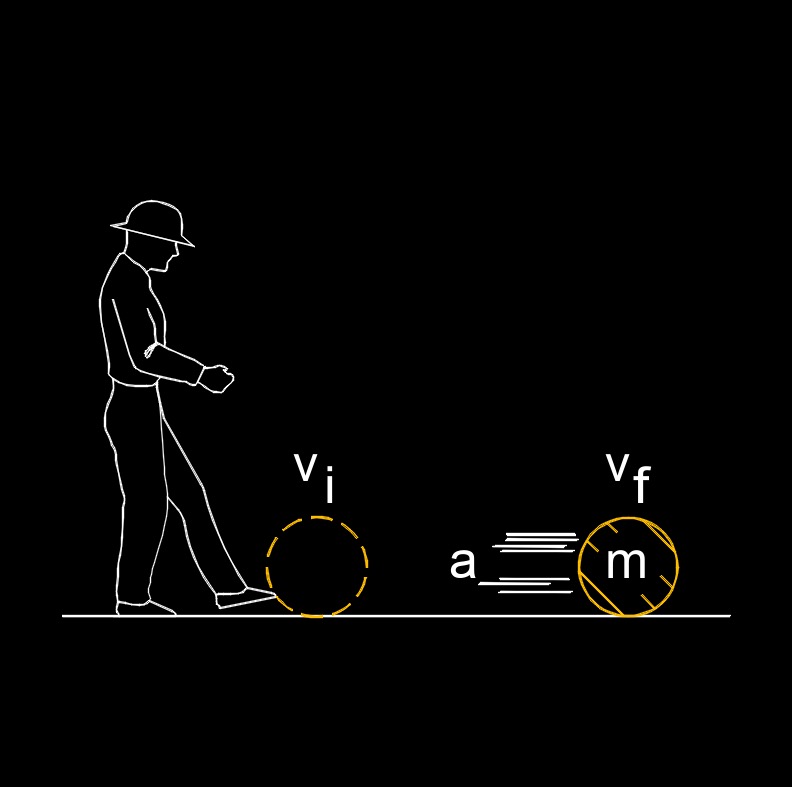Linear Motion
Acceleration Linear Motion Formula |
||
|
\( \overrightarrow{a} \;=\; \dfrac{ \Delta v }{ \Delta t }\) (Acceleration Linear Motion) \( \Delta v \;=\; \overrightarrow{a} \cdot \Delta t \) \( \Delta t \;=\; \dfrac{ \Delta v }{ \overrightarrow{a} }\) |
||
| Symbol | English | Metric |
| \( \overrightarrow{a} \) = Linear Acceleration | \(ft\;/\;sec^2\) | \(m\;/\;s^2\) |
| \( \Delta v \) = Velocity Differential | \(ft\;/\;sec\) | \(m\;/\;s\) |
| \( \Delta t \) = Time Differential | \( sec \) | \( s \) |
 Linear motion, also called rectilinear motion, refers to the motion of an object in a straight line with a constant velocity or changing velocity. In other words, the object moves in a single direction without any rotation or angular movement. Examples of linear motion include a train moving along a straight track, a car moving in a straight line on a highway, or a ball thrown in a straight line. Linear motion can be described mathematically using equations of motion, which relate the displacement, velocity, and acceleration of the object.
Linear motion, also called rectilinear motion, refers to the motion of an object in a straight line with a constant velocity or changing velocity. In other words, the object moves in a single direction without any rotation or angular movement. Examples of linear motion include a train moving along a straight track, a car moving in a straight line on a highway, or a ball thrown in a straight line. Linear motion can be described mathematically using equations of motion, which relate the displacement, velocity, and acceleration of the object.

Displacement Linear Motion Formula |
||
|
\( \overrightarrow{d} \;=\; v_i \cdot t + \dfrac{1}{2} \: a\cdot t^2 \) (Displacement Linear Motion) \( v_i \;=\; \dfrac{ \overrightarrow{d} }{ t } - \dfrac{ 1 }{ 2 } \cdot a \cdot t \) \( t \;=\; \sqrt{ \dfrac{ 2 \cdot \left( \overrightarrow{d} - v_i \cdot t \right) }{ a } }\) \( a \;=\; \dfrac{ 2 \cdot \left( \overrightarrow{d} - v_i \cdot t \right) }{ t^2 }\) |
||
| Symbol | English | Metric |
| \( \overrightarrow{d} \) = Linear Displacement | \( ft \) | \(m \) |
| \( v_i \) = Initial Velocity | \(ft\;/\;sec\) | \(m\;/\;s\) |
| \( t \) = Time | \( sec \) | \( s \) |
| \( a \) = Acceleration | \(ft\;/\;sec^2\) | \(m\;/\;s^2\) |
Velocity Linear Motion Formula |
||
|
\( \overrightarrow{v_f} \;=\; v_i + a \cdot t \) (Velocity Linear Motion) \( v_i \;=\; \overrightarrow{v_f} - a \cdot t \) \( a \;=\; \dfrac{ \overrightarrow{v_f} - v_i }{ t }\) \( t \;=\; \dfrac{ \overrightarrow{v_f} - v_i }{ a }\) |
||
| Symbol | English | Metric |
| \( \overrightarrow{v_f} \) = Linear Final Velocity | \(ft\;/\;sec\) | \(m\;/\;s\) |
| \( v_i \) = Initial Velocity | \(ft\;/\;sec\) | \(m\;/\;s\) |
| \( a \) = Acceleration | \(ft\;/\;sec^2\) | \(m\;/\;s^2\) |
| \( t \) = Time | \( sec \) | \( s \) |
